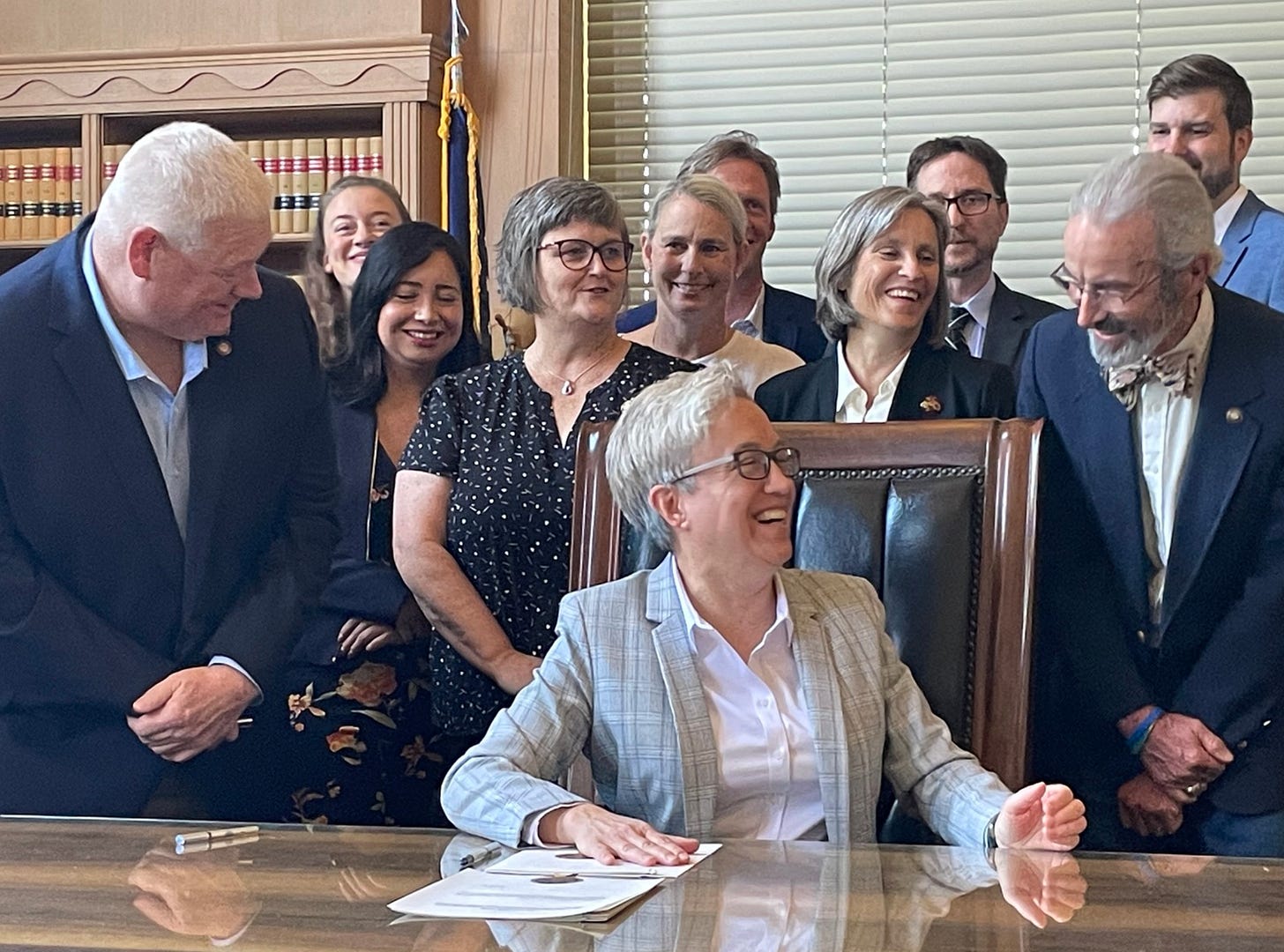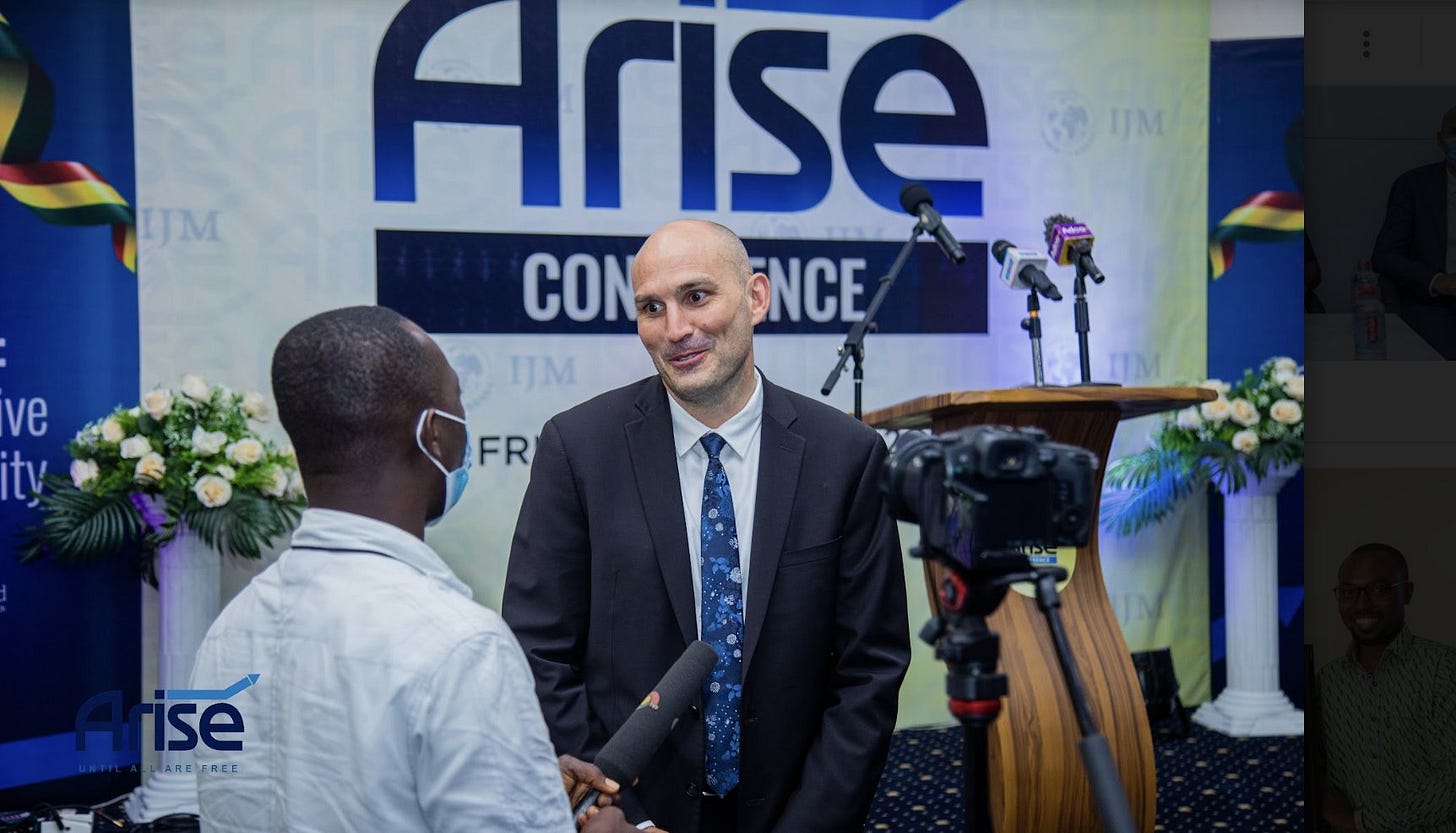The Liftoff: What Gov. Kotek wants in the short session
PLUS: Is Nik Blosser running?; Portland lawmakers head to rural Oregon; lobbying firm declares bankruptcy; Republican candidate for AG raises serious money; Trump will make Oregon ballot; and more!
Welcome back to The Liftoff! Wow, it’s December! How did that happen? If you’re interested in writing an end of the year op-ed, let us know! We are always looking for diverse viewpoints on a range of topics.
As always: Thank you for your likes, clicks, and shares. Want to support us more? Consider becoming a paid subscriber! Looking for the perfect holiday gift? Give the gift of an Oregon 360 paid subscription!
1. Gov. Kotek outlines budget asks for February legislative session—including schools, housing, and ODOT
In February, Oregon lawmakers will return to the Capitol for a 35-day mad dash (called “the short session”) to pass new laws and allocate money. With two months until the start of the short session, Gov. Tina Kotek held a wide-ranging press conference Tuesday where she laid out her plans for the February session. Her asks to the legislature include:
Another $600 million for housing and homelessness
A one-time infusion of $19 million to help the Oregon Department of Transportation conduct winter maintenance
Kotek also addressed the Portland teacher’s strike, which was mainly centered around larger wage increases, smaller class sizes, and more planning time—concerns that many of the 197 school districts in Oregon are also grappling with.
OPB reports that at the press conference, Gov. Kotek said: “I also want to send a signal to those districts to say, ‘We hear you.’ We know there are challenges. We are going to step up and have a different conversation in the coming year.”
As a primer: The Legislature dictates the majority of each of Oregon’s 196 school district budgets.
About two-thirds of Oregon schools’ funding comes from the state in the form of income taxes and lottery revenues.
The other third comes from local property taxes, but all revenues are distributed across districts using a funding formula dictated by the state.
From the Capital Chronicle: “Kotek’s biggest request, $500 million, will be tied to housing production. She set a goal of building 36,000 homes each year – nearly double the average number of homes built in Oregon in recent years. A 2022 state report estimates that Oregon needs to build more than 550,000 homes in the next 20 years to make up for years of underbuilding and keep pace with population growth.”
The Governor also shared at the press conference four priorities for the Oregon Department of Education and the Legislature, all aimed at improving school district funding and transparency of Oregon’s 196 school districts.
Gov. Kotek also said, “she’d convene a group to present a statewide plan for boosting student mental health resources and capacity in schools and would ask an existing group to propose a salary schedule or minimum teacher salary for teachers statewide in order to remedy wages that have not kept up with the cost of living,” reports the Capital Chronicle.
Kotek also announced on Wednesday she is forming an advisory council to guide the role of artificial intelligence in state government. Kotek is charging the Oregon State Government AI Advisory Council with developing a plan for artificial intelligence in state government that values transparency, privacy and equity. It will have up to 15 members, according to the Capital Chronicle.
2. PPS strike reverberates around the state (and other ed news)
Portland Public school teachers ratified their contract Tuesday night after a strike that lasted more than three weeks and canceled 11 school days. The teachers union reported that more than 93% of members voted, with 94.7% voting to ratify. PAT represents the largest group of educators in the district, including classroom and special education teachers, counselors, speech-language pathologists and more, reports OPB.
The PPS strike is obviously over, but if you’re curious of the details of the new contract, OPB did a nice job breaking down the details. The new contract will cost about $175 million over the next three years.
But, as OPB’s politics reporters Dirk VanderHart and Lauren Dake point out, Portland’s woes may be just the beginning for the state. Salem-Keizer schools says it is bracing for at least $70 million in budget cuts in coming months, as it starts labor discussions with teachers.
From OPB’s piece: “Announcing those steps earlier this week, Salem-Keizer Superintendent Andrea Castañeda mirrored a complaint made by Portland leaders: She said the state’s system for funding schools is woefully broken.”
Also from the piece: “What changes might look like remains unclear. Kotek signaled she is interested in the possibility of a minimum statewide teacher salary, a concept currently being studied by lawmakers. There are rumblings that cities could be allowed to raise more money locally for schools without taking a hit to state funding, a move that could raise concerns about creating an era of haves and have-nots?”
More education stories:
From OPB: “A group of Newberg School District parents are taking the district and individual school board members to court. A trial is underway Tuesday in Yamhill County Circuit Court that could result in current and former school board members paying out financially for what parents allege were violations of Oregon’s public meeting laws that cost taxpayers hundreds of thousands of dollars in severance pay and legal fees.”
From OPB: “Union leaders and Bend-La Pine School District officials have another full day of labor contract negotiations on Tuesday as wide gulfs remain over pay, benefits and working conditions.”
3. Sponsored Message from Harrang Long P.C.: Harrang Long’s Political Law Practice
This message is from our sponsor, Harrang Long P.C.
Now that the legislative session is over, Oregon’s activists, candidates, political committees, and ballot measure petitioners are turning their attention to the 2024 elections. Harrang Long P.C. has represented clients in the political arena for decades, handling matters that include the legal requirements of ballot measure petitions, campaign finance disclosures and regulation, political committee organization, ballot access, and election challenges.
Government regulation of political activities becomes more complicated nearly every year, and political actors increasingly initiate regulatory complaints and litigation to achieve political goals. More and more, having experienced legal counsel is critical to success in the political arena.
To learn more about how Harrang Long’s Political Law Practice, check out our website here.
4. Tony Morse is the ”recovery candidate” for Portland City Council
Tony Morse is a candidate for Portland City Council's District 4 (the west side and a small slice of inner east Portland). Tony is an attorney by training and has worked in real estate and political organizing. He describes himself as "center left" and willing to work those who disagree with him to get things done.
In this episode, we talk about Tony's recovery story and what it means to be a "recovery candidate" for the Council—including some specific ideas about how the City can help resolve the crisis. We talk about Ballot Measure 110, harm reduction strategies, public consumption of drugs, and his views on "safe use" sites. Finally, we talk about what it's like running to serve in a new form of government with a totally new way of electing leaders in Portland.
5. Lottery audited, metro lawmakers visit Morrow County, and more news from around the state
Oregon Secretary of State Griffin-Valade released an audit of the Oregon Lottery, the agency that provides the second-largest pot of state funding after income taxes, according to Willamette Week.
One nugget: “The numbers show that state revenue from sports betting jumped substantially and far more than budgeted: The state netted $55.3 million from sports bettors, a 72% increase from 2022. That net gain came from a gross total of $565.5 million bet on sports, which is 7.2% higher than the agency budgeted.”
More news from around Oregon:
Reps. Ricki Ruiz, Khanh Pham, and Annessa Hartman visited Morrow County to hear from residents about water pollution and other issues facing rural Oregon.
Kristin Kinkel, the sister of Thurston High School shooter Kip Kinkel, participated in a rare national media interview (this year marks the 25th anniversary of the shootings). Kristin told The New Yorker that she has maintained a strong bond with Kip, describing her brother as her “best friend”, and that they hope one day he will be released.
From OPB: “In total, the number of Oregon traffic deaths per year rose 73% from 2010 to 2022.”
After just three weeks as leader of the state prison system, Mike Reese told The Oregonian he’s focused on hiring more staff and providing adequate mental health and re-entry services for the estimated 12,100 people serving time in one of Oregon’s dozen prisons.
From The Oregonian: “Surgery delays, frustrated patients stack up after Providence replaces Portland anesthesiology provider”
A jarring quote from the story: “There are people who are going to die because of this. I may be one of them.”
6. Wheeler wants workers back in office, a competitive AG race, and more political news!
Will Lathrop, a former prosecutor in Yamhill and Marion counties, officially announced he is running for Oregon attorney general.
Context from Willamette Week: ”Republicans have not won an AG’s race in Oregon since 1988, when the late Dave Frohnmayer won his third term in that office. In the past two cycles, the GOP candidates challenging incumbent Democrat Ellen Rosenblum, who was appointed to her office in 2012, have barely raised enough money to mount a statewide campaign.”
Lathrop reports having over $150,000 in campaign cash-on-hand. His expected general election competitor, House Speaker Dan Rayfield, has over $500,000 on hand—including over $200,000 raised in November alone.
Willamette Week reports that Rep. Maxine Dexter (D-Portland) is still mulling over a run for Congressman Blumenauer’s seat, and will make a final decision this week.
Mayor Ted Wheeler renewed his plea for downtown Portland employers to bring more of their workers back into their offices to revitalize the economy. Specifically, he is urging employers to have all workers back in offices at least 20 hours a week starting on Jan. 1 (similar to what the City of Portland is already doing), reports The Portland Tribune.
From The Oregonian: “Strategies 360, one of the Northwest’s most prominent lobbying and political consulting firms, filed for Chapter 11 bankruptcy protection Monday night to fight off what it calls a takeover effort launched by a former senior executive.”
Is Nik Blosser running for office? According to WW, he is departing his senior executive job at PGE. Blosser previously served as Gov. Kate Brown’s chief of staff and as chief of staff in President Joe Biden’s Office of Cabinet Affairs.
From WW: “…his departure from the utility after about 18 months coincides with the availability of two big political jobs: mayor of Portland (incumbent Ted Wheeler is not running for reelection) and U.S. representative for Oregon’s 3rd Congressional District (incumbent Earl Blumenauer will not seek a 15th term).”
7. The Way
Amid good revenue news there is coal in the state’s stocking
The State of Oregon received a $218 million Christmas bonus. Oregon income taxpayers will reap a record-shattering $5.61 billion kicker refund on their tax returns next year. But leave it to economists to be party-poopers. The most recent state economic and revenue report contains lots of nuggets that some might view as coal in a Christmas stocking.
8. News Roundup: Trump’s on the ballot and higher ed enrollment climbs
Enrollment at Oregon’s public colleges and universities is the highest it’s been—with the exception of Portland State University—since the start of the pandemic, according to data released by the Higher Education Coordinating Commission.
Oregon State University hired their defensive coordinator Trent Bray as head coach last week, the first time the school has hired from within their ranks in over 60 years, reports The Oregonian.
University of Oregon is facing a Title IX lawsuit from dozens of female athletes claiming that the university is not fulfilling its obligations.
Oregon Secretary of State LaVonne Griffin-Valade won’t bar former President Donald Trump from appearing on primary ballots despite an ongoing pressure campaign, she announced Thursday.
From the Oregon Capital Chronicle: “Beaverton city councilor: Post about ‘different versions’ of Hamas attack wasn’t questioning attack”
Tips? Feedback? Ideas? Corrections? Email benjaminwbowman@gmail.com or kristinaedmunson@gmail.com.
Consider becoming a paid subscriber. Your support helps us grow and offer more opportunities to this community. It’s just $10 a month!
Want to advertise with us? Get in touch!
About the Authors
Ben Bowman is the state representative for Oregon House District 25 (Tigard, Metzger, and South Beaverton) and a member of the Tigard-Tualatin School Board. In his day job, he works as an administrator for a public school district. Previously, he worked as a legislative aide for former Reps. Margaret Doherty and Val Hoyle. He also co-hosts The Oregon Bridge podcast. In the newsletter and podcast, he speaks only for himself.
Alex Titus is a small business owner and consultant to businesses, nonprofits, and associations. Previously, he served as an Advisor in the Trump Administration and as a Policy Advisor to President Trump’s Super PAC. His writing has appeared in National Review, Fox News, The Hill, RealClearPolitics, and other publications.
Kristina Edmunson has been everything from press assistant for Gov. Kulongoski, media advance associate for VP Biden, and communications director for AG Rosenblum. Born and raised in Eugene, she has been involved in some of the biggest policy and legal decisions in Oregon over the last decade. Today, she runs her own communications practice, and sits on Multnomah County’s Community Involvement Community. She speaks only for herself in The Liftoff.












